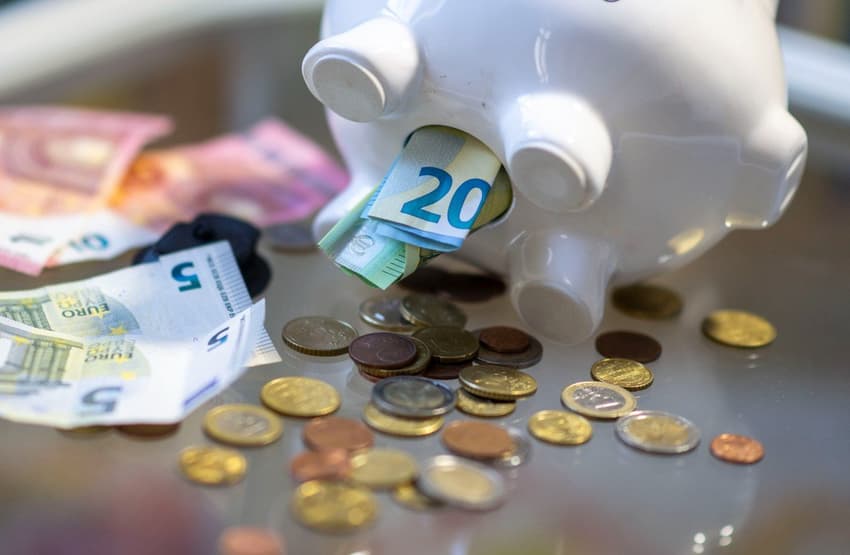What is Germany's 'climate money' plan and why is it delayed?

Germany's governing coalition has been working on plans to redistribute money raised by its CO2 tax to ordinary citizens. Here's why it hasn't happened yet - and what it could mean when it does.
With the climate crisis intensifying with each passing year, slashing carbon emissions and rethinking our lifestyle habits is one of the major challenges of our time.
Though most of us know we have to play our part, it often seems like fighting climate change either involves expense, like swapping out our old heating systems, or missing out on pleasurable things like driving, flying to exotic destinations, or cutting down on meat.
That's partly where the government's plan to introduce something known as 'Klimageld' - or climate money - comes in. What if, instead of feeling deprived, you could feel the benefits of reducing emissions in your bank account each month?
Though it hasn't come to fruition yet, it could only be a matter of time before eco-friendly citizens start to feel that little bit better off.
What is 'Klimageld'?
Klimageld, which translates as climate money, refers to a plan to transfer cash the government has earned from the CO2 tax back to citizens on a monthly or yearly basis.
Currently, the CO2 tax is set at €30 per tonne of carbon emissions, but this is set to rise to €45 per tonne in 2024 and eventually as much as €65 per tonne by 2026 - or possibly even higher. This means that the cost of goods that are more harmful to the planet, such as gas heating or petrol for the car, will see a sharp increase in cost over the coming years.
The thinking behind this is that people will start to consume less of these climate-damaging products as they become less affordable, helping people bring down their individual emissions and make more conscious choices. However, the CO2 tax has been criticised for hitting the poor hardest since everyone will have to bear the same increased costs, regardless of their income.
READ ALSO: The important money and tax changes in Germany in 2024
To make the system fairer and increase acceptance for climate protection measures within the population, the government plans to redistribute the money raised from the CO2 tax in the form of an allowance or rebate. Though everyone would get the same amount, people who make more eco-friendly choices will ultimately do better out of it as they would be paying less CO2 tax than the average person, while receiving the 'average' rebate.
How much would I get in my account?
This will depend on a number of factors, such as how high the CO2 tax happens to be, but thinktank MCC has estimated that people will be entitled to around €130 per year next year.
In 2027, meanwhile, the per-person rate could be as high as €250, meaning a four-person household would receive €1,000.

A woman cooks on a gas stove in the kitchen. Making more climate friendly choices could benefit you financially under the Klimageld scheme. Photo: picture alliance/dpa | Annette Riedl
In an interview with Tagesschau, the Central Consumer Rights Agency (VBZ) said people in Germany were already owed €139 by the government for the past three years of the CO2 tax. It's unclear if these back-payments will be made once Klimageld is finally introduced, however.
READ ALSO: Digitalisation: The German states offering the most online services
Why is it so delayed?
As you might have been able to guess, the long delays to introducing Klimageld are a result of technical issues with the implementation.
According to Finance Minister Christian Lindner (FDP), whose ministry is responsible for finding a way to pay out the climate money, the government needs to find a way to link an individual's bank details to their tax ID - an issue that has been incredibly difficult to solve. In other words, digitalisation is the problem yet again.
When will we see it come in?
Though Klimageld was mentioned in the SPD, Greens, and FDP's coalition pact, there was no mention of a date for implementing it, which has allowed the government to kick the can down the road a little.
However, with the cost of living rising and a major hike in the CO2 tax coming in 2024, pressure has been rising for the policy to finally be introduced.
According to Lindner, the goal for the next few years is to iron out the current issues with implementation and develop a structure for the pay-outs.
"The climate money remains on track," the Finance Minister told RND. "A structure for payment will be created during this legislative period. After that, decisions will be made on the implementation. That - and nothing more - is what we promised as the traffic light. That is what we are sticking to."
READ ALSO: How Germany plans to solve its budget crisis in 2024
Economics Minister Robert Habeck of the Greens has also previously said that he expects the first payments to happen after the next election.
With all three governing parties plummeting in the polls, the question is whether they will have the strength to finish what they start if a new conservative-led government comes into power.
Comments
See Also
With the climate crisis intensifying with each passing year, slashing carbon emissions and rethinking our lifestyle habits is one of the major challenges of our time.
Though most of us know we have to play our part, it often seems like fighting climate change either involves expense, like swapping out our old heating systems, or missing out on pleasurable things like driving, flying to exotic destinations, or cutting down on meat.
That's partly where the government's plan to introduce something known as 'Klimageld' - or climate money - comes in. What if, instead of feeling deprived, you could feel the benefits of reducing emissions in your bank account each month?
Though it hasn't come to fruition yet, it could only be a matter of time before eco-friendly citizens start to feel that little bit better off.
What is 'Klimageld'?
Klimageld, which translates as climate money, refers to a plan to transfer cash the government has earned from the CO2 tax back to citizens on a monthly or yearly basis.
Currently, the CO2 tax is set at €30 per tonne of carbon emissions, but this is set to rise to €45 per tonne in 2024 and eventually as much as €65 per tonne by 2026 - or possibly even higher. This means that the cost of goods that are more harmful to the planet, such as gas heating or petrol for the car, will see a sharp increase in cost over the coming years.
The thinking behind this is that people will start to consume less of these climate-damaging products as they become less affordable, helping people bring down their individual emissions and make more conscious choices. However, the CO2 tax has been criticised for hitting the poor hardest since everyone will have to bear the same increased costs, regardless of their income.
READ ALSO: The important money and tax changes in Germany in 2024
To make the system fairer and increase acceptance for climate protection measures within the population, the government plans to redistribute the money raised from the CO2 tax in the form of an allowance or rebate. Though everyone would get the same amount, people who make more eco-friendly choices will ultimately do better out of it as they would be paying less CO2 tax than the average person, while receiving the 'average' rebate.
How much would I get in my account?
This will depend on a number of factors, such as how high the CO2 tax happens to be, but thinktank MCC has estimated that people will be entitled to around €130 per year next year.
In 2027, meanwhile, the per-person rate could be as high as €250, meaning a four-person household would receive €1,000.

In an interview with Tagesschau, the Central Consumer Rights Agency (VBZ) said people in Germany were already owed €139 by the government for the past three years of the CO2 tax. It's unclear if these back-payments will be made once Klimageld is finally introduced, however.
READ ALSO: Digitalisation: The German states offering the most online services
Why is it so delayed?
As you might have been able to guess, the long delays to introducing Klimageld are a result of technical issues with the implementation.
According to Finance Minister Christian Lindner (FDP), whose ministry is responsible for finding a way to pay out the climate money, the government needs to find a way to link an individual's bank details to their tax ID - an issue that has been incredibly difficult to solve. In other words, digitalisation is the problem yet again.
When will we see it come in?
Though Klimageld was mentioned in the SPD, Greens, and FDP's coalition pact, there was no mention of a date for implementing it, which has allowed the government to kick the can down the road a little.
However, with the cost of living rising and a major hike in the CO2 tax coming in 2024, pressure has been rising for the policy to finally be introduced.
According to Lindner, the goal for the next few years is to iron out the current issues with implementation and develop a structure for the pay-outs.
"The climate money remains on track," the Finance Minister told RND. "A structure for payment will be created during this legislative period. After that, decisions will be made on the implementation. That - and nothing more - is what we promised as the traffic light. That is what we are sticking to."
READ ALSO: How Germany plans to solve its budget crisis in 2024
Economics Minister Robert Habeck of the Greens has also previously said that he expects the first payments to happen after the next election.
With all three governing parties plummeting in the polls, the question is whether they will have the strength to finish what they start if a new conservative-led government comes into power.
Join the conversation in our comments section below. Share your own views and experience and if you have a question or suggestion for our journalists then email us at [email protected].
Please keep comments civil, constructive and on topic – and make sure to read our terms of use before getting involved.
Please log in here to leave a comment.